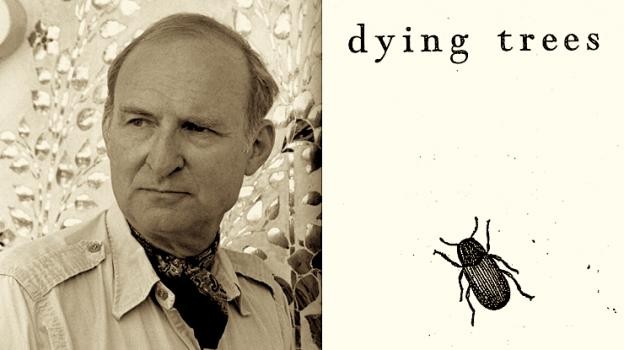
A hole torn in the world (PoemTalk #42)
Nathaniel Tarn, 'Unraveling / Shock'

The eighth section of Nathaniel Tarn’s sequence Dying Trees is titled “Unravelling / Shock.” Dying Trees was first published as a chapbook in 2003; later, in 2008, it was included entirely in Tarn’s New Directions book, Ins and Outs of the Forest Rivers. When the Dying Trees sequence was still unpublished, Tarn gave a reading at the Kelly Writers House (2002) during which he read several sections of the then-new poem, including the one discussed here by Marcella Durand, Burt Kimmelman, Erin Gautsche, and PoemTalk’s producer and host, Al Filreis.
The setting is certainly Tarn’s parched American southwest. Drought is killing the trees; a cancer diagnosis is delivered; nationalism has brought more warring. The convergence of the three forms a “web.” “A hole [has been] torn in the fabric of the world.” News travels bodily; leaders fail to lead; beetles pierce bark; a demonic mouse – “wee” and yet terribly efficacious – compounds the morbidity to the point of body-snatching. It happens as an ecological, medical, and political simultaneity, and the speaker is not in a state to be much concerned about keeping the categories separate. Thus the poem is itself “the whole infernal weave” – a quality more obvious in this eighth section of the poem than in others.
Our talkers, Burt especially (a great admirer of Tarn), found this verging on didactic. And yet Burt, Erin, and Marcella all acknowledge that what’s actually causing the sense of didacticism is the “unravelling” of the poem’s lines and thematic focus.
Burt, Erin, and Marcella each take a turn, toward the end of the discussion, in an effort to relate Tarn’s career-long interest in ethnopoetics to the ecopoetics of the Dying Trees sequence. Indeed, then, they ponder the two categories in general relation.
Back in our poem, “Ghosts” walking among the dying trees get the last word (quoted in the final lines of the poem):
“those days,
those days you took no notice of, counting them poor,
dispersing them among the memories you could not value
at their truth worth, you could not recognize enough to feel:
who knows if these few days, these very days, were not
those ones lived together here, the only paradise?”
Tarn, an eminent anthropologist as well as a poet, finds a speaker at the apparent end of the world and has him describe a paradise lost; the verb is lived, not live.
- - -
In 2003, Jacket published two sections of Dying Trees, the 7th and 9th. The 9th, entitled “Golden Globes of Hopefulness,” was also recorded during the Kelly Writers House reading mentioned above. Jacket also published Tarn’s review of a book about Robert Duncan and illness. And Jacket 39 included a wide-ranging feature of essays and commentary on Tarn’s work overall.
PoemTalk #42 was directed and engineered by James LaMarre, and edited, as always, by Steve McLaughlin.